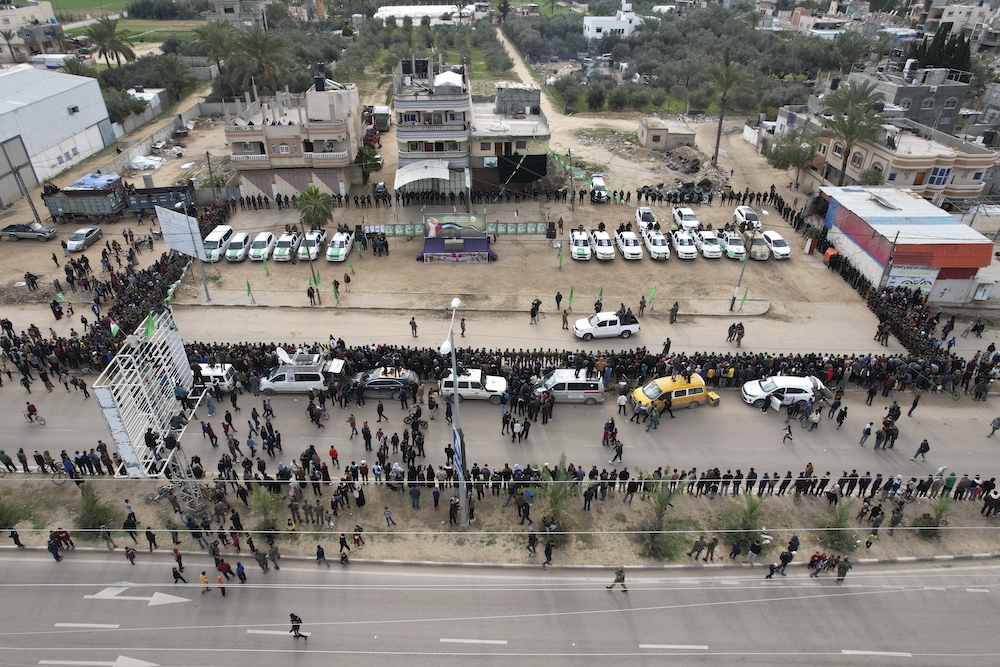CAIRO: Israeli tanks forged deeper into eastern Rafah on Tuesday, reaching some residential districts of the southern border city where more than a million people had been sheltering, raising fears of yet further civilian casualties.
Israel’s international allies and aid groups have repeatedly warned against a ground incursion into refugee-packed Rafah, where Israel says four Hamas battalions are holed up.
The World Court, also known as the International Court of Justice (ICJ), said it would hold hearings on Thursday and Friday to discuss a request by South Africa seeking new emergency measures over the Rafah incursion, which Qatar says has stalled efforts to reach a ceasefire.
South Africa’s demand is part of a case it brought against Israel accusing it of violating the genocide convention in Gaza, and which Israel has called baseless. Israel will provide its views on the latest petition on Friday, the ICJ said.
Israel has vowed to press on into Rafah even without its allies’ support, saying the operation is necessary to root out remaining Hamas fighters.
“The tanks advanced this morning west of Salahuddin Road into the Brzail and Jneina neighborhoods. They are in the streets inside the built-up area and there are clashes,” one resident told Reuters via a chat app.
Palestinian residents of western Rafah later said they could see smoke billowing above the eastern neighborhoods and hear the sound of explosions following an Israeli bombardment of a cluster of houses.
Hamas’s armed wing said it had destroyed an Israeli troop carrier with an Al-Yassin 105 missile in the eastern Al-Salam district, killing some crew members and wounding others.
The Israel Defense Forces (IDF) declined to comment on the report.
In a round-up of its activities, the IDF said its forces had eliminated “several armed terrorist” cells in close-quarter fighting on the Gazan side of the Rafah border crossing with Egypt. In the east of the city, it said it had also destroyed militant cells and a launch post from where missiles were being fired at IDF troops.
’NOWHERE IS SAFE’
Israel issued evacuation orders for people to move from parts of eastern Rafah a week ago, with a second round of orders extending to further zones on Saturday.
They are moving to tracts of land such as Al-Mawasi, a sandy strip bordering the coast that aid agencies say lacks sanitary and other facilities to host an influx of displaced people.
UNRWA, the main United Nations aid agency in Gaza, estimates some 450,000 people have fled Rafah since May 6, warning “nowhere is safe,” in the enclave of 2.3 million.
The war has pushed much of Gaza’s population to the brink of famine, the UN says, and has devastated its medical facilities, where hospitals, if working at all, are running short of fuel to power generators and other essential supplies.
James Smith, a British emergency room doctor volunteering in hospitals in southern Gaza, said he had been told by a World Health Organization official that some emergency fuel had made it into the Gaza Strip, potentially enough for six days.
“Health is still being prioritized over other essential services, so when health looks a bit better it generally means other essential services are struggling,” he told Reuters via a WhatsApp voice note. “It’s a zero-sum game.”
FIERCE GUN BATTLES
Fighting across the Strip has intensified in recent days, including in the north, with the Israeli military heading back into areas where it had claimed to have dismantled Hamas months ago. Israel says the operations are to prevent Hamas, which runs Gaza, from rebuilding it military capacities.
The Palestinian death toll in the war has now surpassed 35,000, according to Gaza health officials, whose figures do not differentiate between civilians and fighters. It said that 82 Palestinians were killed in the past 24 hours, the highest death toll in a single day in many weeks.
Israel launched its Gaza operation following a devastating attack on Oct. 7 by Hamas-led gunmen who rampaged through Israeli communities near the enclave, killing some 1,200 people and taking more than 250 hostages, according to Israeli tallies.
In the Zeitoun neighborhood of Gaza City in the north, bulldozers demolished clusters of houses to make a new road for tanks to roll through into the eastern suburb.
In northern Gaza’s Jabalia, a sprawling refugee camp built for displaced Palestinians 75 years ago, residents said Israeli forces were trying to reach as deep as the camp’s local market under heavy tank shelling.
Residents said fierce gunbattles were continuing in Jabalia. Hamas and the armed wing of Islamic Jihad said they were fighting Israeli forces there.
“Many people are being trapped in their houses. We lost contact with some relatives after they were warned by the army in phone calls to leave and they refused,” Nasser, 57, a father of six, told Reuters, using an international phone card.
A strike on a house in Beit Lahiya, northern Gaza, killed seven people and wounded several others, medics said.
The IDF said it had killed dozens of Hamas fighters in Jabalia and dismantled a network of explosives, while in Zeitoun it located tunnel shafts and destroyed several rocket launchers.
With fighting intensifying, Qatar’s Prime Minister Sheikh Mohammed bin Abdulrahman Al-Thani said ceasefire talks, mediated by his country and Egypt, were at a stalemate.






















